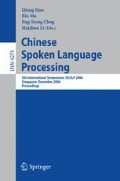Abstract
In this paper we present our Hidden Markov Model (HMM)-based, Mandarin Chinese Text-to-Speech (TTS) system. Mandarin Chinese or Putonghua, “the common spoken language”, is a tone language where each of the 400 plus base syllables can have up to 5 different lexical tone patterns. Their segmental and supra-segmental information is first modeled by 3 corresponding HMMs, including: (1) spectral envelop and gain; (2) voiced/unvoiced and fundamental frequency; and (3) segment duration. The corresponding HMMs are trained from a read speech database of 1,000 sentences recorded by a female speaker. Specifically, the spectral information is derived from short-time LPC spectral analysis. Among all LPC parameters, Line Spectrum Pair (LSP) has the closest relevance to the natural resonances or the “formants” of a speech sound and it is selected to parameterize the spectral information. Furthermore, the property of clustered LSPs around a spectral peak justify augmenting LSPs with their dynamic counterparts, both in time and frequency, in both HMM modeling and parameter trajectory synthesis. One hundred sentences synthesized by 4 LSP-based systems have been subjectively evaluated with an AB comparison test. The listening test results show that LSP and its dynamic counterpart, both in time and frequency, are preferred for the resultant higher synthesized speech quality.
Access this chapter
Tax calculation will be finalised at checkout
Purchases are for personal use only
Preview
Unable to display preview. Download preview PDF.
References
Zen, H., Toda, T.: An Overview of Nitech HMM-based Speech Synthesis System for Blizzard Challenge 2005. In: Proc. EuroSpeech (2005)
Tokuda, K., Zen, H., Black, A.W.: An HMM-based speech synthesis system applied to English. In: 2002 IEEE Speech Synthesis Workshop, Santa Monica, California, September 11-13 (2002)
Tokuda, K., Kobayashi, T., Masuko, T., Kobayashi, T., Kitamura, T.: Speech Parameter generation algorithms for HMM-based speech synthesis. In: Proc. ICASSP, Istanbul, Turkey, June 2000, pp. 1315–1318 (2000)
Tomoki, T., Keiichi, T.: Speech Parameter Generation Algorithm Considering Global Variance for HMM-Based Speech Synthesis. In: Proc. Eurospeech 2005 (2005)
Kawahara, H., Masuda-Katsuse, I., Cheveigne, A.: Restructuring speech representations using a pitch-adaptive time-frequency smoothing and an instantaneousfrequency- based f0 extraction: possible role of a repetitive structure in sounds. Speech Communication 27, 187–207 (1999)
Zen, H., Tokuda, K., Masuko, T., Kobayashi, T., Kitamura, T.: Hidden semi-Markov model based speech synthesis. In: Proc. ICSLP, pp. 1185–1180 (2004)
Itakura, F.: Line spectrum representation of linear predictive coefficients of speech signals. J. Acoust. Soc. Am. 57, S35 (1975)
Fukada, T., Tokuda, K., Kobayashi, T., Imai, S.: An adaptive algorithm for melcepstral analysis of speech. In: Proc. ICASSP, pp. 137–140 (1992)
Soong, F.K., Juang, B.H.: Line spectrum pair (LSP) and speech data compression. In: Proc. ICASSP, San Diego, CA, pp. 1.10.1–1.10.4. (1984)
Tokuda, K., Masuko, T., Miyazaki, N., Kobayashi, T.: Multi-space Probability Distribution HMM. IEICE Trans. Inf. & Syst. E85-D(3), 455–464 (2002)
Shinoda, K., Watanabe, T.: Acoustic Modeling Based on The MDL Principle for Speech Recognition. In: Proc. EuroSpeech 1997, pp. 99–102 (1997)
Wakita, H.: Linear prediction voice synthesizers: line spectrum pairs (LSP) is the newest of the several techniques. Speech Technol. 1, 17–22 (1981)
Paliwal, K.K.: On the use of line spectral frequency parameters for speech recognition. Digital Signal Processing 2, 80–87 (1992)
Chu, M., Peng, H., Yang, H., Chang, E.: Selecting non-uniform units from a very large corpus for concatenative speech synthesizer. In: Proc. ICASSP 2001, Salt Lake City (2001)
Huang, C., Shi, Y., Zhou, J.L., Chu, M., Wang, T., Chang, E.: Segmental Tonal Modeling for Phone Set Design in Mandarin LVCSR. In: Proc. ICASSP 2004, pp. 901–904 (2004)
Zen, H., Tokuda, K., Kitamura, T.: A Viterbi algorithm for a trajectory model derived from HMM with explicit relationship between static and dynamic features. In: Proc. of ICASSP 2004, pp. 837–840 (2004)
Wu, Y.J., Wang, R.H.: Minimum generation error training for HMM-based speech synthesis. In: Proc. of ICAPP 2006, pp. 89–93 (2006)
Author information
Authors and Affiliations
Editor information
Editors and Affiliations
Rights and permissions
Copyright information
© 2006 Springer-Verlag Berlin Heidelberg
About this paper
Cite this paper
Qian, Y., Soong, F., Chen, Y., Chu, M. (2006). An HMM-Based Mandarin Chinese Text-To-Speech System. In: Huo, Q., Ma, B., Chng, ES., Li, H. (eds) Chinese Spoken Language Processing. ISCSLP 2006. Lecture Notes in Computer Science(), vol 4274. Springer, Berlin, Heidelberg. https://doi.org/10.1007/11939993_26
Download citation
DOI: https://doi.org/10.1007/11939993_26
Publisher Name: Springer, Berlin, Heidelberg
Print ISBN: 978-3-540-49665-6
Online ISBN: 978-3-540-49666-3
eBook Packages: Computer ScienceComputer Science (R0)

